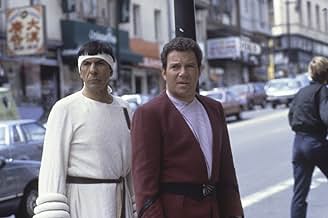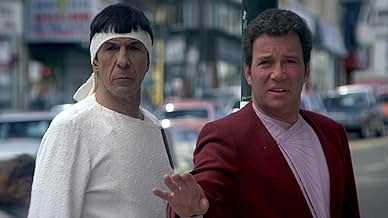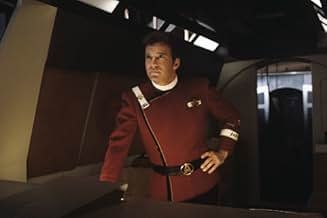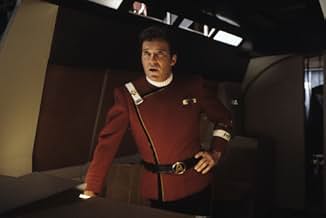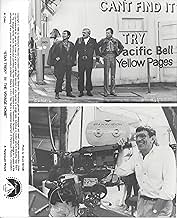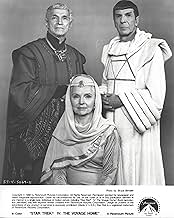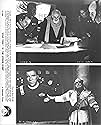To save Earth from an alien probe, Admiral James T. Kirk and his fugitive crew go back in time to San Francisco in 1986 to retrieve the only beings who can communicate with it: humpback whal... Read allTo save Earth from an alien probe, Admiral James T. Kirk and his fugitive crew go back in time to San Francisco in 1986 to retrieve the only beings who can communicate with it: humpback whales.To save Earth from an alien probe, Admiral James T. Kirk and his fugitive crew go back in time to San Francisco in 1986 to retrieve the only beings who can communicate with it: humpback whales.
- Nominated for 4 Oscars
- 4 wins & 19 nominations total
Featured reviews
The film sees Kirk and his crew, in disgrace after disobeying Starfleet orders to save Spock following the events of 'Star Trek III: The Search for Spock', travel to 1986 San Francisco to retrieve a pair of hump-back whales, a species extinct by Kirk's era. The whales are the key to communicating with an alien probe that is in the process of destroying Earth. As well as the non-too-subtle eco-message ('don't allow any animal be hunted to extinction as they may save us all in the future!'), there is much fun to be had as Kirk, McCoy, Uhura, Sulu, Scotty and the ever-logical Spock struggle to integrate themselves into most alien situation they have ever been in. They are clueless about exact-change buses, pizzas and why 1986 doctors think it's a good idea to drill into someone's head.
It is very light-hearted at times but I imagine this is the film Gene Roddenberry is most proud of given the way it portrays the best of all our favourite characters and reaches the heart of the ethos of 'Star Trek'. When I first watched this as a child, I wished Kirk would come and let me join him in the twenty-third century. In fact, the only thing that could improve this film would be if the probe had aimed its venegeance entirely at Japan and Norway in retaliation for the sins of these countries' backward twenty-first century 'ancestors'. After all, it's these two countries who will surely bring about the extinction of whales.
While this doesn't delve too much into the mythology and background of Trek, it is a great film and deserves to be counted as the best of the ten films. It is also an excellent option for Trek fans trying to convert friends and family to 'seeing the light' and loving Trek!
This appealing, lighthearted entry is fun to watch, and Trekkies are sure to love it and non-fans will most likely find it top-notch. The charming movie is full of enjoyable characters, comedy, and overemphasis on excellent special effects. Entertaining story with intelligent ecological message about a humpbacks whales saving mankind.Evocative musical score with usual leitmotif by Leonard Rosenman. Colorful and glamorous cinematography by Don Petterman. The motion picture is well directed by Leonard Nimoy in his best film. Suitable for family viewing , it's a bemusing adventure which young and old men will enjoy. Fans of the series will find very amusing and fun, but followed by an inferior outing: Star Trek 5: The final frontier(1989) directed by William Shatner.
3.5/4 stars
Did you know
- TriviaAs the alien probe approaches Earth at the film's beginning, it emits a sound wave that Spock determines to be an attempt to communicate with humpback whales. After the first test screening and at the suggestion of Harve Bennett, Paramount Pictures studio heads sent Leonard Nimoy a memo asking him to create an on-screen subtitle to translate the sound, and suggested "Where are you?". Nimoy and Nicholas Meyer insisted that any explanation of what the probe and the whales were saying would ruin the sense of mystery. Eventually, Nimoy convinced Paramount Studios to not use subtitles.
- GoofsWhen Sulu accidentally turns on the windshield wipers of the helicopter, the wipers were broken so a grip had to move the wipers manually. Look closely and you can see his finger holding on to the blade as it moves back and forth.
- Quotes
[Spock is still learning how to use profanity correctly]
Spock: They like you very much, but they are not the hell "your" whales.
Dr. Gillian Taylor: I suppose they told you that.
Spock: The hell they did.
- Crazy creditsThe film opens with a dedication to the crew of the Space Shuttle Challenger. - European cinema versions contains a short summary of the two previous movies instead of dedication.
- Alternate versionsThe Australian and Germany release summaries mentioned above (they are the same) also included music unique to the prologue. This prologue has not been included on any North American DVD release of the film.
- ConnectionsEdited from Star Trek III : À la recherche de Spock (1984)
- SoundtracksTheme From Star Trek (TV Series)
by Alexander Courage
Details
- Release date
- Country of origin
- Languages
- Also known as
- Viaje a las estrellas IV - Misión: Salvar la Tierra
- Filming locations
- Production company
- See more company credits at IMDbPro
Box office
- Budget
- $25,000,000 (estimated)
- Gross US & Canada
- $109,713,132
- Opening weekend US & Canada
- $16,881,888
- Nov 30, 1986
- Gross worldwide
- $109,713,132
- Runtime
- 1h 59m(119 min)
- Color
- Sound mix
- Aspect ratio
- 2.39 : 1



